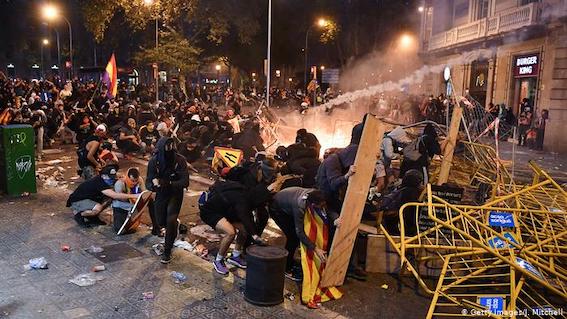We are posting this article from Popular Unity Candidacy in Catalunya. It describes the situation in Catalunya, Euskadi and Spain in the aftermath of the draconian prison sentences imposed on those the Spanish state deemed responsible for the the Catalan Republic referendum. It also describes the situation after Spanish general election held on November 10th.
MOBILISATIONS AGAINST THE CATALAN VERDICT AND
THE SPANISH GENERAL ELECTION
The popular response against the verdict of the trials, and the state response of this popular mobilization has shown the problem again: the state, the government and the courts. .
One month of struggle for self-determination and against repression
Since the verdicts came out last 14th October condemning former government and cultural leaders to between 9 to 13 years of prison, Catalonia has experienced a month of unrest on a scale and intensity that no one predicted. A mobilisation of sustained and spectacular actions included the blocking of Barcelona airport, forcing the cancellation of more than 150 flights, the cutting of all of the main road and rail arteries, several massive demonstrations across Barcelona, the biggest general strike in recent memory, spontaneous riots in reaction to police brutality, and the blocking of the border with the French state for 30 hours. In the fifteen days following the verdicts, 204 people were arrested, 30 of whom have been imprisoned pending trials, 17 of them continue to be in prison today. 2 of them were sent to deportation centres, one already has been deported. And four people have lost an eye to police rubber bullets.
Some important distinctions can be made between the movement in 2017 and the current mobilisation. As the Catalan political institutions remain largely incapacitated by a fight between the two biggest Catalan parties for hegemony, very large numbers of people have learned to organise their own forms of political expression. At the same time, those leading this stage of the mobilisation are much yMalagaounger than those who led the previous one in 2017. They have not been disciplined by the fear of criminalisation that the State attempted to create. They have displayed a wider repertoire of collective action, including the use of barricades for self-defence against police violence. This younger generation have been the victims of the economic crisis and the austerity since they were very young. As the left independence youth organisation ARRAN noted recently, they suffer capitalismophobia: the expression of a political malaise due to the rapidly deteriorating conditions of their present and future.
The broader political character of the current mobilisation is also demonstrated by solidarity demonstrations in Madrid, in Sevilla, Granada and Malaga. Those protests have been growing in size and have been massive in the Basque country. The left has been increasingly vocal about Spanish state violence and the silence of Podemos.
The Spanish elections of the 10th November
The elections of the last 10th of November represent a repetition of the results of the previous ones that occurred in April. It was the impossibility to reach a government agreement which make compulsory to run for new elections. But it seems that this time will be an agreement between the PSOE and Podemos after the latter abandoning the main social goals in order to be in the government. It is impossible that this government can solve the Catalan question either if they do not accept the right of self-determination and the amnesty for all the political prisoners. This seems quite unlikely right now if mobilisation does not force them to move from their position. The most scaring of the result of the elections is the massive growth of VOX, the fascist party is now the third party in MP’s with 52. The transfer of votes from Ciudadanos, a right-wing liberal party, to the extreme-right represents a major issue in the radicalisation of the Spanish nationalism.
The elections in the Catalan Countries
In Catalonia the elections brought a new victory for ERC (13 MP’s), the rising of JuntsxCat (8 MP’s) and the entrance of CUP. The independentist forces got its best result overall in the Spanish elections. CUP run for the Spanish elections for the first time because of the exceptional repressive situation. We got 245.000 votes and 2 MP’s for the Spanish Congreso. We were only 2.000 votes away from the third in Girona. These results need to be understood as very positive as we had no media coverage and because we were focusing on the mobilisation, instead focusing on the elections.
In Valencia VOX reached the third force, after the PSOE and the PP which is a very worrying scenario. Podemos lost one seat and was the fourth party while Compromís Valencià was sixth and got one MP. In the Balearic Islands it was a draw in MP’s between the PSOE, the PP, Podemos and VOX getting 2 MP’s each. No other party got representation. CUP decided not to run in these parts of the nation as the organisation there has other priorities beyond the elections. At the same time, the quickness in the elections’ call made very difficult to organise our candidacy in territories in which we had no previous experience beyond the local elections.
also see:-

